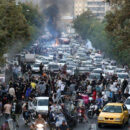Iran Protests: Nationwide Demonstrations Against Executions, Low Wages, and Poor Living Conditions

NCRI | Sedighe Shahrokhi | 10/22/2024
Iran witnessed a surge of protests today as people across multiple cities took to the streets to voice their grievances against government policies. From calls to end executions to demands for better pensions and working conditions, the demonstrations highlight growing discontent across various segments of society.
In Tehran, protesters gathered outside the Iranian regime’s parliament to denounce the regime’s ongoing use of the death penalty. Chanting “Stop the executions! Stop the executions!” the demonstrators expressed their outrage over the continued and frequent use of capital punishment, which has drawn widespread condemnation from human rights organizations worldwide. This protest comes amid a period of heightened public scrutiny of the government’s harsh penal practices, seen as a tool of repression against dissenting voices.
Meanwhile, retired government employees held rallies in Tehran and Kermanshah, demanding higher pensions and improved living conditions. Despite promises of pension adjustments, retirees argue that the increases outlined in the new budget plan are insufficient to keep pace with the rising cost of living. In Kermanshah, the retirees’ gathering was met with support from local residents who honked car horns and applauded, showing solidarity with the protesters. The government’s latest budget proposal, which includes a 20% increase in pensions, was submitted to Parliament today, but many see it as inadequate given the country’s ongoing economic crisis.
The protests were not limited to the capital and retirees. Across Iran’s energy-rich regions, contract workers at the South Pars Gas Company continued their strike, demanding fair wages, better working conditions, and attention from authorities. The strikes, known as “Tuesday Protests,” have been ongoing for twelve weeks, showing the workers’ resilience despite mounting pressure.
Reports from Asaluyeh, Kharg Island, and Mahshahr indicate that oil and gas workers have been staging similar demonstrations, decrying low pay, excessive work hours, and the government’s failure to honor previous agreements. In Asaluyeh, workers described aggressive encounters with security forces who tried to disperse the gatherings. However, despite attempts to stifle the protests, employees managed to continue their demonstrations, underscoring their determination to secure their rights.
Additionally, official employees in the oil sector have protested in Kharg, Siri, and other key industrial hubs over the government’s failure to implement legislation that would remove unjust salary caps for those working in operational zones. Workers have also been vocal about unfair pension cuts, unfulfilled promises, and discriminatory practices within the industry, particularly concerning tax regulations and retirement policies. The rallies are a direct challenge to the oil ministry’s inaction, as employees seek the full implementation of existing legal frameworks that would improve their financial and job security.
Today’s protests are a continuation of a larger wave of dissent sweeping across Iran, cutting across different social and professional groups. The clerical regime’s economic mismanagement has left millions struggling with skyrocketing inflation, high unemployment rates, and inadequate public services. This deepening crisis has led to a visible surge in activism, as people increasingly take to the streets to hold the government accountable.








